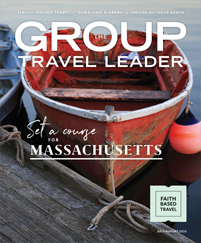When the April eruption of the Eyjafjallajokull volcano in Iceland sent a massive cloud of ash into the skies over Europe, the resulting air traffic shutdown left thousands of group tour passengers in limbo.
For nearly a week, travelers in Europe and the United States waited to make transatlantic trips home, many of them forced to sleep in crowded airports or pay outlandish hotel fees. But for tour operators with passengers among those stranded, the disaster provided an opportunity to show their real value and customer service.
Stuck in Europe
Collette Vacations had about 450 travelers stuck in Europe in mid-April waiting for airspace to open so that they could fly home.
“We were working around the clock on this,” said Collette CFO John Galvin. “We had the air department constantly working on rebooking their flights and protecting them on their booked flights. The overwhelming majority of the passengers had a guide with them on the ground, so we made sure they had rooms and that they had things to see and do while they were stuck.”
Globus Family of Brands, which operates several different travel brands, had about 2,000 passengers on the ground in Europe when the volcano erupted. As a result, they had to get creative to find hotel accommodations for some customers waiting to fly home.
“We’re also in the river cruise business, and we had a river cruise ship in Paris that was supposed to be going on a charter for a big group that never made it there,” said Globus president and CEO Scott Nisbet. “So we turned that ship into a hotel for our passengers who were on tour in Paris. They were able to have three meals a day and everything else that Avalon gives.”
Some tour operators were able to allow their customers to use the company’s precontracted group rates for their hotel stays, giving them a significant savings on their extended trips.
The professional services of tour directors and other tour company representatives helped those waiting for a flight out to make the best of their situation.
“For people that were delayed in coming home, we had our tour director staying in the hotel with them,” said Tom Armstrong, marketing and communications manager for Tauck World Discovery. “They would set up a Tauck concierge desk in the lobby. They did whatever was required, from arranging sightseeing activities to refilling prescription medications.”
Delayed tour departures
Many more group tour customers were affected when the ash cloud prevented them from flying to Europe to join tours that were about to begin. For those who were unable to make their tours, many tour operators offered to rebook them on future tours or to waive fees and refund deposit money.
The United States Tour Operators Association reported that nearly 90 percent of its members were rebooking clients on future trips, extending company credits, offering refunds or waiving cancellation fees.
Many travel insurance policies covered the event as well, treating it as a weather disruption.
“Ninety-five percent of our passengers bought the insurance, and the overwhelming majority are booking on other dates,” said Collette’s Galvin. “We gave them all their money back and the insurance back, so they’re not out a penny. If you didn’t have our insurance and you wanted to rebook, we moved the money to the future date.”
At Globus, those with flexible travel dates were rebooked on future departures. Some passengers who couldn’t travel at another time traveled to alternate destinations instead.
“Some people moved to a totally different destination,” Nesbit said. “If they were planning on going to Europe but had their vacation time scheduled, they traveled in the United States or went to South America instead.”
Not all passengers headed to Europe missed their trips, however. Some were able to join their tours a day or two after their scheduled departure dates; others found creative ways to get where they were going.
“We had some people that demonstrated some real tenacity and were able to join the start of their tours,” Tauck’s Armstrong said. “We didn’t cancel or combine any departures. We had some with lighter loads, but some people had made really massive efforts to get there, so we didn’t want to cancel their tours.”
Quick Response:
Successive Disasters have industry playing defense
Gulf Coast mobilizes to contain and confront effects from oil spill











